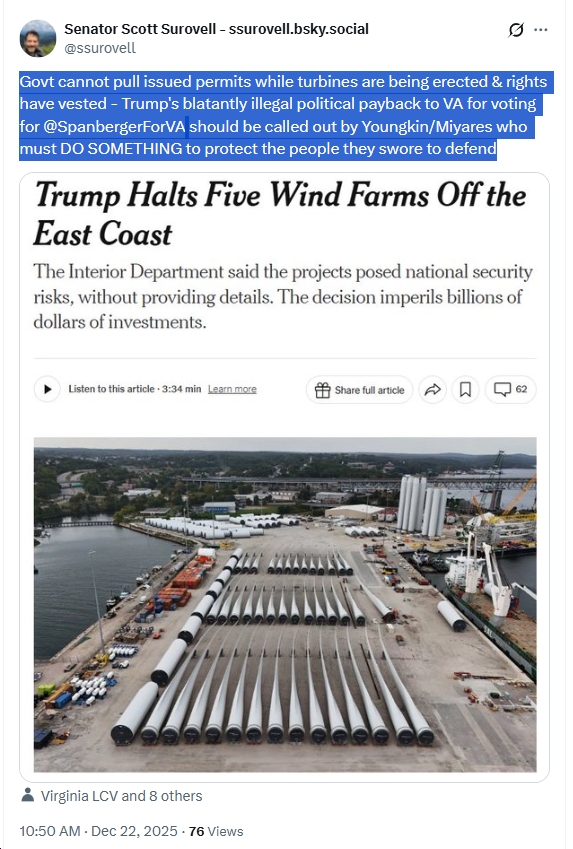 by Charlie Spatz, cross posted from the Climate Investigations Center
by Charlie Spatz, cross posted from the Climate Investigations Center
In the coming weeks, Dominion Energy will almost certainly try to deliver a $50,000 check to Governor-elect Northam for his inaugural committee. In Virginia politics this is routine–since 1998 Dominion has contributed over $225,000 to gubernatorial inaugural committees. No other corporation has donated more than Dominion to these committees according to records kept by the Virginia Public Access Project.
But this might be the first year a Governor-elect considers whether it’s politically acceptable to cash Dominion’s check. A new class of elected officials will enter office in January having pledged not to accept Dominion contributions as a result of a pledge circulated by Activate Virginia. For many political observers, this is a major development in Virginia politics, where Dominion’s lobbying and nearly $11 million in political contributions have long controlled both parties, resulting in favorable legislation for the investor-owned monopoly. While votes must still be confirmed by local electoral boards, at least 12 of these Democrats are expected to join the Virginia House of Delegates. Northam’s own running mate, Lt. Governor-elect Justin Fairfax, also signed Activate Virginia’s pledge and opposed Dominion’s controversial Atlantic Coast Pipeline, leading to a well documented feud that resulted in the removal of Fairfax from some of Northam’s campaign literature.
Activate Virginia’s pledge did not sway Northam from accepting funds during the Virginia gubernatorial primary and the general election. Northam’s gubernatorial campaignaccepted over $72,000 from Dominion’s Political Action Committee and over $65,000 from Dominion employees. Stronger Together PAC, which is controlled by Northam, has received $48,000 from Dominion PAC and over $13,000 from employees. Attorney General Herring accepted over $89,000 from both Dominion’s PAC and employees over his last two campaigns.
Northam came under pressure for the Dominion donations during the Democratic primary from his challenger Tom Perriello, who pledged not to accept donations from the monopoly and also opposed the Atlantic Coast Pipeline. Northam responded by pledging sweeping campaign finance reform that would ban corporate contributions and cap contributions to candidates at $10,000 from all donors except political party committees. But he refused to turn down such contributions, saying that “defeating Ed Gillespie can’t be done with one arm tied behind our back, and we’re not going to unilaterally disarm.”
With no opponent, that argument would not seem to apply to accepting corporate contributions to Northam’s inaugural committee.
In the last three decades, nearly every Governor elect has funded their inaugural committees with corporate contributions. Beyond Dominion, contributions have come from corporations such as Appalachian Power, Exxon, Verizon, and Capital One. If Northam were to turn away corporate contributions, he’d likely be the first Governor-elect to do so in recent memory.
Legislation in the works to curtail Dominion contributions
The momentum to clear the Virginia General Assembly of political contributions from state regulated monopolies will be up for consideration come January, the beginning of Virginia’s 2018 General Assembly session. State Senator Chap Petersen intends to reintroduce legislation to ban such contributions; that bill failed to move out of committee in 2017. In an interview with the Richmond Times Dispatch, Democratic Minority Leader Delegate David Toscano acknowledged that the bill will receive more support from legislators in the upcoming session.
“I can tell you that there are a number of folks who are very concerned about the regulated utilities giving contributions to candidates and I think that bill’s going to come up and I think there’s going to be a lot of support for it and we’ll just have to see how much support there is,” Toscano said.
Lee Carter, one of the 12 newly elected Democrats who pledged to refuse Dominion money, has already indicated he’s prepared to stand up to Dominion and even his own party to limit the electric monopoly’s influence. Carter told InsideNova Online, “My feelings on Dominion are not going to change no matter how much they sweet talk me…This is a very old fight, and hopefully with this new energy and the potential majority we’ve got, we can deliver a knockout blow.”

















